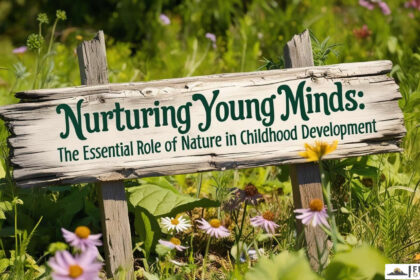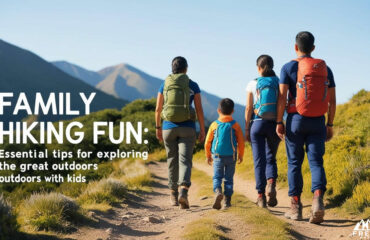
Discover how nature plays a vital role in childhood development, enhancing cognitive, emotional, and social skills for a healthier future.
The Importance of Nature in Early Childhood Development
The initial years of a child’s life are pivotal for their overall development, and engaging with nature plays a crucial role in enhancing their well-being and learning capabilities. Studies indicate that children today spend only about four hours outdoors each week, which is significantly less—approximately 50%—than what their parents experienced during childhood. This decline in outdoor activity is concerning because interactions with natural environments can lead to improvements in cognitive functioning, attention span, and overall mental health, which are essential for a child’s development. For instance, children who frequently play outside in green spaces demonstrate higher self-esteem and lower levels of anxiety and depression. Furthermore, exposure to natural light can help regulate sleep patterns and uplift mood, which are critical for healthy growth.
Nature-based activities also stimulate creativity and imagination, allowing children to explore their surroundings freely. Engaging in unstructured play in natural settings encourages children to use their creativity, develop problem-solving skills, and learn from their environment. For example, a child building a fort from sticks and leaves not only exercises their imagination but also learns about balance and structure. The benefits of outdoor play extend beyond physical health; they significantly contribute to cognitive and emotional development, fostering a holistic approach to childhood growth.
Cognitive Development
Nature experiences are known to significantly enhance cognitive functions, creativity, and academic performance in children. Interaction with natural environments promotes critical thinking and helps children develop a broader understanding of the world around them. Research shows that children between the ages of 3 and 12 benefit considerably from exposure to nature, as it fosters creativity, independence, and social skills. For example, children who participate in outdoor activities such as nature scavenger hunts not only learn about their environment but also enhance their observational skills and attention spans.
Engaging in outdoor play enhances sensory skills and spatial awareness, which are vital for cognitive development. Studies indicate that children who spend regular time in natural settings tend to have better focus and perform academically better than their peers who have limited outdoor experiences. For instance, a child learning to navigate a hiking trail develops spatial awareness and problem-solving skills as they assess their surroundings and make decisions based on their observations. Such interactions with nature are essential for fostering a well-rounded cognitive development in children.
Emotional Well-Being
Regular exposure to natural environments has been shown to reduce stress levels and promote emotional well-being in children, often comparable to the influences of family background. Playing in natural settings decreases anxiety and stress, contributing to better mental health outcomes. Nature-centric therapies are increasingly being recommended for children facing mental health challenges, underscoring the need for equitable access to natural experiences. For instance, children engaged in activities like gardening or simply playing in a park often report feeling calmer and more relaxed.
Natural environments also provide calming effects that help children manage their emotions and develop resilience. Interactions with animals and plants can enhance empathy and emotional intelligence in children, cultivating a deeper connection to the world around them. Unstructured play in nature allows children to express their feelings freely and build confidence in handling various emotional situations. For example, a child who cares for a pet or plants in a garden learns about responsibility and empathy, which are crucial components of emotional development.
Social Skills Development
Engaging in socially interactive activities in nature fosters cooperation, responsibility, and environmental consciousness among children. Green spaces provide opportunities for safe risk-taking, which is essential for children’s social competence and development. For instance, children playing team sports in a park learn teamwork and communication skills while navigating the physical challenges of outdoor play.
Free play in natural settings is critical for developing problem-solving skills and emotional well-being. Group activities such as scavenger hunts, building forts, or even simple games like tag encourage children to work together, share, and collaborate. These experiences can lead to lasting friendships and improved social networks, as children learn to navigate social dynamics in a less structured environment. The outdoors encourages children to engage with peers, which enhances their social skills and lays a foundation for healthy relationships in the future.
Educational Benefits
Integrating nature into educational strategies can support holistic child development by enhancing cognitive skills through exploration and problem-solving in diverse environments. Nature-based learning encourages children to understand ecosystems and the importance of water through hands-on activities, such as visiting local rivers or parks. This method of learning not only makes education engaging but also instills a sense of curiosity and love for the environment.
Nature-centric curricula can improve student engagement and motivation in school, fostering a love for learning. Educators have reported that children who frequently spend time outdoors show increased enthusiasm for academic subjects. For instance, a program that incorporates outdoor classrooms allows children to learn about science by directly observing nature, which has been linked to higher retention rates of information among students. Such educational approaches underscore the importance of outdoor experiences in supporting children’s development.
Parental Engagement
Parents play a crucial role in encouraging their children to spend more time outdoors and engage with nature. By partnering with educational institutions, parents can help provide a holistic education that nurtures the physical, cognitive, and emotional growth of their children. Engaging with local food producers can also be a valuable experience, helping children understand the origins of their food and promoting healthier eating habits.
Structured and unstructured outdoor activities can be created to enhance children’s connection to nature. Parents can model positive outdoor behaviors, emphasizing the importance of valuing nature and its benefits. Family outings in natural settings not only foster stronger bonds but also create shared experiences that contribute to emotional development. Providing opportunities for independent play in natural environments can significantly boost children’s confidence and decision-making skills, setting the stage for a lifetime of healthy habits.
The Lasting Impact of Nature on Child Development
The evidence indicating nature’s indispensable role in fostering healthy growth and mental health in children is compelling. Policymakers must recognize and allocate resources for integrating nature into children’s development to ensure that all children benefit, regardless of their socioeconomic status. Encouraging a love for nature in early childhood not only fosters conservation values but also nurtures a sense of environmental stewardship.
Long-term exposure to nature can lead to healthier lifestyle choices and increased physical activity as children transition into adulthood. Nature experiences during childhood are linked to a lifelong appreciation and care for the environment. Integrating nature into daily routines can establish habits that promote ongoing mental and physical health, ensuring that children grow into well-rounded, responsible adults who value the natural world around them.



